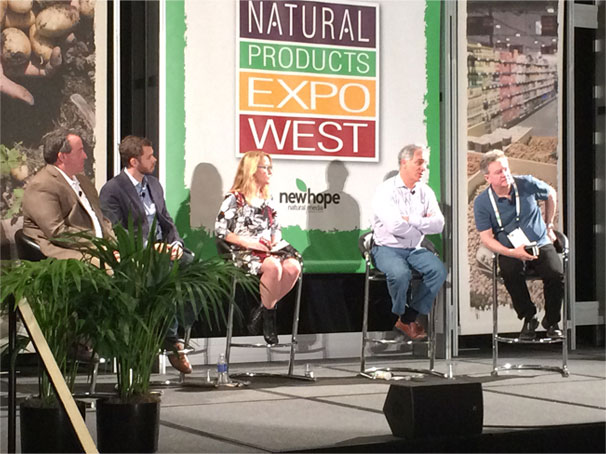
Speakers at GMO labeling panel session at Natural Products Expo West, from left: Jim Leahy, Colin O’Neil, Melody Meyer, Gary Hirshberg, and Ken Cook
To access all the articles in this month's issue of The Organic & Non-GMO Report, SUBSCRIBE NOW.
GMO labeling supporters say DARK Act is a “scam” that must be stopped
By Ken Roseboro
Published: March 27, 2015
Category: GM Food Labeling and Regulations
Industry is deceiving the public that Pompeo bill is “national solution” for GMO labeling
Federal legislation that would establish voluntary labeling of genetically modified foods is a scam that aims to deceive the American public and must be stopped. This was the takeaway message of a recent panel discussion on GMO labeling held at Natural Products Expo West in Anaheim, California.
“National labeling solution” is a deceptive scam
Last fall Kansas Congressman Mike Pompeo introduced the so-called “Safe and Affordable Food Labeling Act,” that would allow food companies to voluntarily label their products as containing GM ingredients and preempt state GMO labeling initiatives.
Opponents of Pompeo’s bill have dubbed it the DARK Act (Deny Americans the Right to Know) because it would not allow mandatory GMO labeling. “The Grocery Manufacturers Association has come up with a diabolical campaign with this ‘Safe and Accurate Food Labeling Act,’” said Gary Hirshberg, chairman of Stonyfield Farm and Just Label It. “This bill would preempt all state (labeling efforts) and stamp out the grassroots. By making it law, we will never get the FDA to institute mandatory labeling.”
Colin O’Neil, director of government affairs at the Center for Food Safety, said that agribusiness and the biotech industry are trying to deceive the public while lobbying intensely for the US government to pass the DARK Act. “The industry is trying to reframe this as a ‘national labeling solution,’” he said. “They are trying to convince states and members of Congress that a national solution is needed.”
In reality, the groups want Congress to pass a voluntary labeling standard that the FDA issued guidance on in 2001. “These companies have had the right to voluntarily label since 2001,” Hirshberg said. “It’s a scam; it looks like they’re supporting labeling, but they’re not.”
Not one company has voluntarily labeled their products as containing GM ingredients, Hirshberg said.
Melody Meyer, vice president for policy and industry relations at United Natural Foods, emphasized the need for GMO transparency. “We want mandatory GMO labeling nationally,” she said.
GMOs all about increasing pesticides
Passing the DARK Act would allow biotech companies to “get away with murder,” Hirshberg said. “It’s raining herbicides in the Midwest. This is an ecological disaster.”
Hirshberg said that GM crops are all about increasing pesticide use. “We are on a chemical treadmill,” he said.
Americans should have the same right as more than 60 other nations that have mandatory GMO labeling. “We aren’t radical and crazy. Give Americans the right to know what’s in their food. We want the same right to know as what the Russians have,” Hirshberg said.
“Our federal government has failed us,” O’Neil said. “The consumer is always right but why aren’t they right now (about GMO labeling)?”
State initiatives were victories
Jim Leahy, a representative with Citizens for GMO Labeling, described state initiatives to label GM foods. To date, Vermont, Connecticut, and Maine have passed labeling bills though Connecticut and Maine’s legislation depends on several other states passing bills.
GMO labeling bills are also moving through state governments in Massachusetts, New York, Rhode Island, and other states. “It’s hard for opponents to fight multiple targets,” Leahy said. “If we have fights in 30 capitals, it gets harder for opponents to win.”
Hirshberg emphasized the importance of the state GMO labeling initiatives including the ballot initiatives that fell short in California, Washington, Oregon, and Colorado. “All were victories,” he said. “They all elevated the conversation.”
DARK Act must be stopped
O’Neil said he expects the DARK Act to be reintroduced in mid-March. “It’s important for us to be on the defense. We must defeat it and move to mandatory labeling,” O’Neil said.
All panel speakers emphasized the urgency of stopping the DARK Act. “The time is now,” Meyer said. “There is a threat with the Pompeo bill. If we don’t take this time now, we may not get the time in the future.”
Leahy said that state labeling initiatives would help the national effort. “A bill could pass in Massachusetts,” he said. “The perception that things are moving forward (at the state level) will force our opponents to take the defensive.”
Consumers should contact food companies that oppose GMO labeling. “We need to engage people to pressure food companies and hold them accountable,” Hirshberg said. “It’s outrageous that big companies are spending money to deny us from knowing what’s in our food.”
© Copyright The Organic & Non-GMO Report, April 2015
